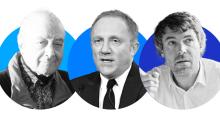Karl-Johan Persson under pressure as H&M posts weak sales
Sales at Swedish family-run business H&M are not growing as strongly as forecasted, leaving managing director Karl-Johan Persson under increased pressure.
Last month, sales at H&M rose just 3% compared to July 2010 - a significant change on the company’s predicted growth of 4.7%. Comparable units sales also took a knocking, decreasing by 6%. Comparable units comprise the stores, online shops and catalogue sales in countries that have been in operation for at least a financial year.
Karl-Johan took on the top role at the fast-fashion retailer in 2007, just before the global economic downturn took hold.
The difficult trading conditions that followed hit H&M hard, with sales increasing by just 4% and comparable units sales decreasing by 5% during the 2008/2009 financial year.
However, under the 36-year-old’s leadership, a strong improvement was seen during the last financial year – with sales rising 15% overall and 5% when the comparable units sales figures were used.
Karl-Johan has focused heavily on opening new stores as part of his efforts to grow the business – there were 2,306 H&M shops on 31 July 2011 compared to 2,066 on the same day in 2010. However, the latest figures may raise concerns that more emphasis needs to be placed on increasing sales at established stores.
While the company declined to comment on its weak sales, analysts say issues such as high cotton prises have had an impact on the company’s bottom line, especially as H&M decided not to pass on the increased costs to consumers. This should leave the global retailer in a good position as cotton prices continue their downward spiral, although one of its main rivals, Inditex, which owns Zara, also adopted a similar strategy.
H&M is often cited as an example of good succession planning, where younger generations are given a chance to make their mark. The business was founded in 1947 by Karl-Johan’s grandfather Erling Persson, with son Stefan Persson becoming chief executive officer in 1990. Karl-Johan succeeded non-family chief executive Rolf Eriksen, who had taken on the role following Stefan’s retirement when he was 51.
The family own 37% of the company’s common stock and 69% of the voting stock.






